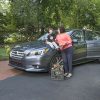Q&A: Everyday Healthcare Hero Explains The Importance of Nutrition for Cancer Treatment
We all know the age-old idiom “an apple a day keeps the doctor away.” It’s simple: a healthy diet can lead to improved health. But did you know the pivotal role nutrition plays in cancer treatment? Nhu Huynh, the director of nutrition and culinary at Philly’s Cancer Treatment Center of America, explains that it’s not quite as easy as devouring a Red Delicious or Granny Smith, but that strategic, individualized nutrition plans can do loads to increase the effectiveness of cancer treatments. And in order to ensure that she can always make it to work (she didn’t miss a single day this winter) and avoid unnecessary hurdles, she and her family opt for Subaru vehicles. So when it comes to helping her patients fight cancer, she can focus on what’s important.
We chatted with Huynh to get the scoop on the relationship between nutrition and healthcare and how her Subaru makes life all-around simpler.
What’s the biggest change you’ve noticed in the healthcare field? How do you think it will be different 10 years from now?
I have been with CTCA for eight years and in my role as a director, I also work as a clinician. And the biggest change I see in healthcare is that there are more alignments, particularly with intensive treatments, quality of care, proactive nutrition, and the integrations of the business with how we care for our patients.
The reason I’m saying it is because I’m fortunate that I’m at CTCA where that model is established and nutrition is part of the patient care. Every patient has a meeting with a nutritionist. And with adequate nutrition, our patients can go through treatment with, hopefully, fewer side effects. I am able to align their treatment with nutrition.
How did you begin you career in nutrition and healthcare?
I went to school at Drexel University for undergrad and then I worked for the public school system and the public library in the health and wellness system. I’ve worked in different hospitals. For a year, I travelled a lot and worked with different systems and with the experience I had, I learned that I really liked working with cancer patients because I found nutrition to be such a huge aspect of cancer care. I was invited to come to CTCA because I was looking to change careers and I valued what a big part of cancer care nutrition is here.
How has your Subaru made your life easier?
Subaru is so dependable. I love the design. It’s not flashy; it’s classic. It’s very safe. I’m so happy with my Subaru. I drive from Hatfield to get to CTCA and with the winter storms we had all winter, I didn’t miss a single day of work.
What model Subaru do you drive?
[I drive a] 2009 Subaru Impreza. My husband and mom also drive Subaru vehicles. [Laughs] We’re a Subaru family!
Has there been a moment where your career in healthcare and being an owner of a Subaru has intersected?
Particularly in healthcare, it’s the reliability of a car that’s really important—inconvenient weather or not. If a car breaks down often, [that’s a problem and] I never have that. There’s very minimal [upkeep] required for a Subaru. That helps with my busy schedule for healthcare.
What’s the most exciting aspect of your job right now?
One project we’re working on is establishing a larger support system for the caregiver at home using technology. That way, if you only come to CTCA once every six months, we can check in using technology and give more of a support system for the caregiver. For people who want that service, we’re working to provide that. Many people come to CTCA from a distance. We’re working on integrating culinary and nutrition support from a distance. We’re testing it right now.
Do you work strictly with patients or do you also offer community initiatives?
We do a lot of community service with patients. We work with the public. We actually have classes for the Philadelphia community at the public library two times a month to promote wellness and help the community to make changes for their health. We have usually have one dietician and one chef and they’ll show kitchen skills. Some classes focus on aspects such as maintaining gluten free diets, knife skills or healthy cooking for families.
What’s one thing you wish people knew about the intersection between wellness and nutrition?
Most people think that healthy eating is expensive. I think with society being so busy and work/schedule and family commitment, [it’s tricky], but good nutrition can be easily accomplished. It’s just planning. It doesn’t need to be expensive, it doesn’t need to be complicated, but it does need to be a priority.
What’s one thing people can do today to improve their overall nutrition?
Eat more fruit and vegetables. Actually, try to include a variety — particularly while spring is here! It’s not hard to include that. I suggest going to a local farmers market when it’s possible. Be open-minded and try different kinds of vegetables and fruits that you haven’t tried before. And get the family involved!
For more information about finding the right ride for you, visit Subaru, here.
This is a paid partnership between Subaru and Philadelphia Magazine



